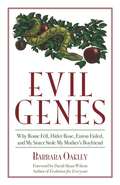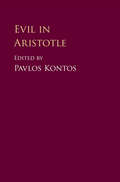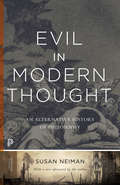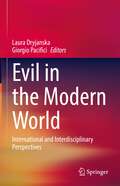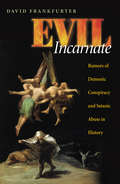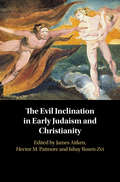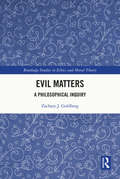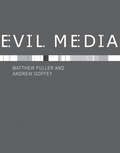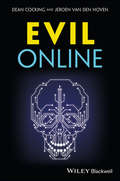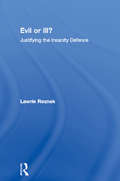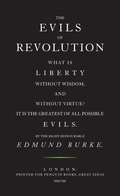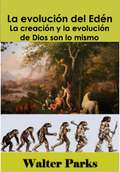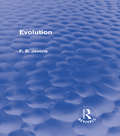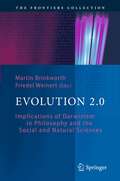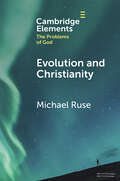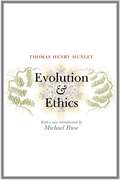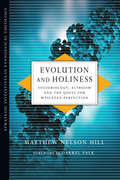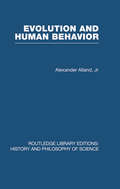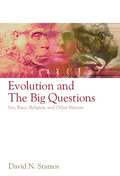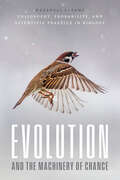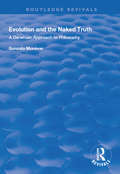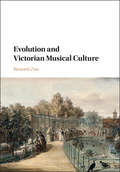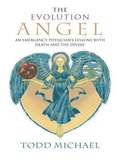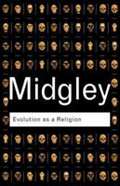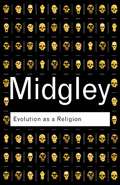- Table View
- List View
Evil Genes: Why Rome Fell, Hitler Rose, Enron Failed, and My Sister Stole My Mother's Boyfriend
by Barbara A. OakleyAdventurer, writer, business executive, academic, and so on, Oakley (engineering, Oakland U. , Michigan) draws on her studies in bioengineering to offer genetic explanations for why some people are naturally exploitative, and so often succeed at it from the global to the family scale.
Evil in Aristotle
by Pavlos KontosAristotle's notion of evil is highly elaborate and attractive, yet has been largely overlooked by philosophers. While most recent studies of evil focus on modern understandings of the concept, this volume shows that Aristotle's theory is an invaluable resource for our contemporary understanding of it. Twelve leading scholars reconstruct the account of evil latent in Aristotle's metaphysics, biology, psychology, ethics, and politics, and detect Aristotelian patterns of thought that operate at certain landmark moments in the history of philosophy from ancient thought to modern day debates. The book pays particular attention to Aristotle's understanding of 'radical evil', an important and much disputed topic. Original and systematic, this study is the first to provide a full exploration of evil in Aristotle's work, shedding light on its content, potential, and influence. The volume will appeal to scholars of ancient Greek philosophy as well as to moral philosophers and to historians of philosophy. Provides the first systematic account of Aristotle's notion of evil, showing that it is both elaborate and attractive; Considers the question of 'radical evil' in Aristotle, a highly disputed topic in ancient and modern philosophy; Traces the influence of Aristotelian thought on evil in later philosophers' work, making this book important for those interested in moral philosophy as well as in the history of philosophy.
Evil in Modern Thought
by Susan NeimanEvil threatens human reason, for it challenges our hope that the world makes sense. For eighteenth-century Europeans, the Lisbon earthquake was manifest evil. Today we view evil as a matter of human cruelty, and Auschwitz as its extreme incarnation. Examining our understanding of evil from the Inquisition to contemporary terrorism, Susan Neiman explores who we have become in the three centuries that separate us from the early Enlightenment. In the process, she rewrites the history of modern thought and points philosophy back to the questions that originally animated it. Whether expressed in theological or secular terms, evil poses a problem about the world's intelligibility. It confronts philosophy with fundamental questions: Can there be meaning in a world where innocents suffer? Can belief in divine power or human progress survive a cataloging of evil? Is evil profound or banal? Neiman argues that these questions impelled modern philosophy. Traditional philosophers from Leibniz to Hegel sought to defend the Creator of a world containing evil. Inevitably, their efforts--combined with those of more literary figures like Pope, Voltaire, and the Marquis de Sade--eroded belief in God's benevolence, power, and relevance, until Nietzsche claimed He had been murdered. They also yielded the distinction between natural and moral evil that we now take for granted. Neiman turns to consider philosophy's response to the Holocaust as a final moral evil, concluding that two basic stances run through modern thought. One, from Rousseau to Arendt, insists that morality demands we make evil intelligible. The other, from Voltaire to Adorno, insists that morality demands that we don't. Beautifully written and thoroughly engaging, this book tells the history of modern philosophy as an attempt to come to terms with evil. It reintroduces philosophy to anyone interested in questions of life and death, good and evil, suffering and sense. Featuring a substantial new afterword by Neiman that raises provocative questions about Hannah Arendt's take on Adolf Eichmann and the rationale behind the Hiroshima bombing, this Princeton Classics edition introduces a new generation of readers to this eloquent and thought-provoking meditation on good and evil, life and death, and suffering and sense.
Evil in the Modern World: International and Interdisciplinary Perspectives
by Laura Dryjanska Giorgio PacificiThis interesting volume focuses on a set of phenomena which increasingly alarm the political world and public opinion: from the more obvious ones like torture, disease, human trafficking, abuse, genocide, displacement, to more subtle forms found in sports, technology and law. It looks at how and why these phenomena are universally condemned, and could be considered to threaten the very foundations of modern democracy; yet continue to be tolerated. The volume therefore goes beyond what Hannah Arendt has called the "banality of evil" and discusses the presence of condemned and heinous practices in society as fluid and chaotic but as non-trivial; capable of great transmutations through various epochs. Practices and actions considered as "evil" manifest in situations where individuals or groups hold power or seize power, and the contributions in this volume explore the close relation between power and evil. The volume draws upon sociology, psychology, cultural studies, political science, as well as philosophy, theology, anthropology, and neurology of the individual and of the group to provide a comprehensive understanding of the multiple facets of evil in the contemporary world.
Evil Incarnate: Rumors of Demonic Conspiracy and Satanic Abuse in History
by David FrankfurterIn the 1980s, America was gripped by widespread panics about Satanic cults. Conspiracy theories abounded about groups who were allegedly abusing children in day-care centers, impregnating girls for infant sacrifice, brainwashing adults, and even controlling the highest levels of government. As historian of religions David Frankfurter listened to these sinister theories, it occurred to him how strikingly similar they were to those that swept parts of the early Christian world, early modern Europe, and postcolonial Africa. He began to investigate the social and psychological patterns that give rise to these myths. Thus was born Evil Incarnate, a riveting analysis of the mythology of evil conspiracy. <p><p> The first work to provide an in-depth analysis of the topic, the book uses anthropology, the history of religion, sociology, and psychoanalytic theory, to answer the questions "What causes people collectively to envision evil and seek to exterminate it?" and "Why does the representation of evil recur in such typical patterns?" <p><p> Frankfurter guides the reader through such diverse subjects as witch-hunting, the origins of demonology, cannibalism, and the rumors of Jewish ritual murder, demonstrating how societies have long expanded upon their fears of such atrocities to address a collective anxiety. Thus, he maintains, panics over modern-day infant sacrifice are really not so different from rumors about early Christians engaging in infant feasts during the second and third centuries in Rome. <p><p> In Evil Incarnate, Frankfurter deepens historical awareness that stories of Satanic atrocities are both inventions of the mind and perennial phenomena, not authentic criminal events. True evil, as he so artfully demonstrates, is not something organized and corrupting, but rather a social construction that inspires people to brutal acts in the name of moral order.
The Evil Inclination in Early Judaism and Christianity
by Ishay Rosen-ZviOne of the central concepts in rabbinic Judaism is the notion of the Evil Inclination, which appears to be related to similar concepts in ancient Christianity and the wider late antique world. The precise origins and understanding of the idea, however, are unknown. This volume traces the development of this concept historically in Judaism and assesses its impact on emerging Christian thought concerning the origins of sin. The chapters, which cover a wide range of sources including the Bible, the Ancient Versions, Qumran, Pseudepigrapha and Apocrypha, the Targums, and rabbinic and patristic literature, advance our understanding of the intellectual exchange between Jews and Christians in classical Antiquity, as well as the intercultural exchange between these communities and the societies in which they were situated.
Evil Matters: A Philosophical Inquiry (Routledge Studies in Ethics and Moral Theory)
by Zachary J. GoldbergThis book is an inquiry into particular matters concerning the nature, normativity, and aftermath of evil action. It combines philosophical conceptual analysis with empirical studies in psychology and discussions of historical events to provide an innovative analysis of evil action. The book considers unresolved questions belonging to metaethical, normative, and practical characteristics of evil action. It begins by asking whether Kant’s historical account of evil is still relevant for contemporary thinkers. Then it addresses features of evil action that distinguish it from mundane wrongdoing, thereby placing it as a proper category of philosophical inquiry. Next, the author inquires into how evil acts affect moral relationships and challenge Strawsonian accounts of moral responsibility. He then draws conceptual and empirical connections between evil acts such as genocide, torture, and slavery and collective agency, and asks why evil acts are often collective acts. Finally, the author questions both the possibility and propriety of forgiveness and vengeance in the aftermath of evil and discusses how individuals ought to cope with the pervasiveness of evil in human interaction. Evil Matters: A Philosophical Inquiry will be of interest to advanced students and researchers in philosophy working on the concept of evil, moral responsibility, collective agency, vengeance, and forgiveness.
Evil Media
by Matthew Fuller Andrew GoffeyA philosophical manual of media power for the network age.Evil Media develops a philosophy of media power that extends the concept of media beyond its tried and trusted use in the games of meaning, symbolism, and truth. It addresses the gray zones in which media exist as corporate work systems, algorithms and data structures, twenty-first century self-improvement manuals, and pharmaceutical techniques. Evil Media invites the reader to explore and understand the abstract infrastructure of the present day. From search engines to flirting strategies, from the value of institutional stupidity to the malicious minutiae of databases, this book shows how the devil is in the details. The title takes the imperative “Don't be evil” and asks, what would be done any differently in contemporary computational and networked media were that maxim reversed.Media here are about much more and much less than symbols, stories, information, or communication: media do things. They incite and provoke, twist and bend, leak and manage. In a series of provocative stratagems designed to be used, Evil Media sets its reader an ethical challenge: either remain a transparent intermediary in the networks and chains of communicative power or become oneself an active, transformative medium.
Evil Online (Blackwell Public Philosophy Series #31)
by Dean Cocking Jeroen Van den Hoven"I am delighted to offer my highest praise to Dean Cocking and Jeroen van den Hoven's brilliant new book, Evil Online. The confrontation between good and evil occupies a central place in the challenges facing our human nature, and this creative investigation into the spread of evil by means of all-powerful new technologies raises fundamental questions about our morality and values. Cocking and Van den Hoven's account of the moral fog of evil forces us to face both the demons within each of us as well as the demons all around us. In the end, we are all enriched by their perceptive analyses."—Phil Zimbardo, Professor Emeritus of Psychology, Stanford University Principal Investigator, Stanford Prison Experiment "The internet offers new and deeply concerning opportunities for immorality, much of it shocking and extreme. This volume explains with great insight and clarity the corrupting nature of the internet and the moral confusion it has produced. It will play a vital role in the growing debate about how to balance the benefits of the internet against the risks it poses to all of us. Evil Online is an excellent book."—Roger Crisp, Professor of Moral Philosophy, University of Oxford We now live in an era defined by the ubiquity of the internet. From our everyday engagement with social media to trolls on forums and the emergence of the dark web, the internet is a space characterized by unreality, isolation, anonymity, objectification, and rampant self-obsession—the perfect breeding ground for new, unprecedented manifestations of evil. Evil Online is the first comprehensive analysis of evil and moral character in relation to our increasingly online lives. Chapters consider traditional ideas around the phenomenon of evil in moral philosophy and explore how the dawn of the internet has presented unprecedented challenges to older theoretical approaches. Cocking and Van den Hoven propose that a growing sense of moral confusion—moral fog—pushes otherwise ordinary, normal people toward evildoing, and that values basic to moral life such as autonomy, intimacy, trust, and privacy are put at risk by online platforms and new technologies. This new theory of evildoing offers fresh insight into the moral character of the individual, and opens the way for a burgeoning new area of social thought. A comprehensive analysis of an emerging and disturbing social phenomenon, Evil Online examines the morally troubling aspects of the internet in our society. Written not only for academics in the fields of philosophy, psychology, information science, and social science, Evil Online is accessible and compelling reading for anyone interested in understanding the emergence of evil in our digitally-dominated world.
Evil or Ill?: Justifying the Insanity Defence (Philosophical Issues in Science #9)
by Lawrie ReznekLawrie Reznek addresses these questions and more in his controversial investigation of the insanity defense in Evil or Ill? Drawing from countless intriguing case examples, he aims to understand the concept of an excuse, and explains why the law excuses certain actions and not others. In his easily accessible and elegant style, he explains that in law, there exists two excuses derived from Aristotle: the excuses of ignorance and compulsion. Reznek, however proposes a third excuse - the excuse of character change. In introducing this third excuse, Reznek raises a controversial possibility - the abolition of the insanity defence.
The Evils of Revolution
by Edmund BurkeWritten at a time when most of Europe supported the French Revolution, Edmund Burke’s prescient and, at the time, controversial denunciation of its mob rule predicted the Terror, began the modern conservative tradition and still serves as a warning to those who seek to reshape societies through violence. Throughout history, some books have changed the world. They have transformed the way we see ourselves – and each other. They have inspired debate, dissent, war and revolution. They have enlightened, outraged, provoked and comforted. They have enriched lives – and destroyed them. Now Penguin brings you the works of the great thinkers, pioneers, radicals and visionaries whose ideas shook civilization and helped make us who we are.
La evolución del Edén: Adán y Eva científicos: La creación y la evolución de Dios son lo mismo.
by Walter ParksLa Biblia nos dice que Dios nos creó en el Jardín del Edén. La evidencia científica nos indica que evolucionamos a partir de animales inferiores. La evolución del Edén analiza las dicotomías entre ambas teorías y vemos que son parte de lo mismo.
Evolution (Routledge Revivals)
by F. B. JevonsFirst published in 1900, this philosophical essay on Evolution questions how the acceptance of Evolution as scientific should influence the thoughts and actions of humankind from the perspective of morality and moral conduct. In his discussion, Frank B. Jevons deals with such subjects as pessimism and optimism towards evolutionary theory, the laws of motion and matter, and the importance of scientific evidence.
Evolution 2.0
by Friedel Weinert Martin BrinkworthThese essays by leading philosophers and scientists focus on recent ideas at the forefront of modern Darwinism, showcasing and exploring the challenges they raise as well as open problems. This interdisciplinary volume is unique in that it addresses the key notions of evolutionary theory in approaches to the mind, in the philosophy of biology, in the social sciences and humanities; furthermore it considers recent challenges to, and extensions of, Neo-Darwinism. The essays demonstrate that Darwinism is an evolving paradigm, with a sphere of influence far greater than even Darwin is likely to have imagined when he published 'On the Origin of Species' in 1859.
Evolution and Christianity (Elements in the Problems of God)
by Michael RuseThis Element discusses the relationship between Christianity and evolutionary theory, with special emphasis on Darwinian evolutionary theory (Darwinism). The Creationists argue that the two are incompatible and it is religion that is the truth and Darwinism the falsity. The New Atheists argue that the two are incompatible and it is religion that is the falsity and Darwinism the truth. Through a careful examination of both Darwinian theory and Christianity, it is shown that both extremes are mistaken. It is accepted that there are difficult issues to be solved, for example the problem of evil - which some think is exacerbated by Darwinism - and the necessarily appearance of Homo sapiens - which is problematic if evolutionary theory does not guarantee progress and the evolution of humans as the apotheosis. It is argued that there are ways forward, and Christianity and evolutionary thinking can be shown compatible.
Evolution and Ethics: And Other Essays
by Thomas Henry HuxleyHuxley's classic lecture on evolution, human nature, and the way to true happinessThomas Henry Huxley (1825–1895) was one of the most prominent evolutionists of the late nineteenth century. A close companion of Charles Darwin, Huxley developed a reputation as "Darwin's Bulldog" for his relentless defense of evolutionary theory. Huxley was also an ardent supporter of social reform, particularly in his call for quality education at all levels. Evolution and Ethics, widely considered to be his greatest lecture, distilled a lifetime's wisdom and sensitive understanding of the nature and needs of humankind. Arguing that the human psyche is at war with itself, that humans are alienated in the cosmos, and that moral societies are necessarily in conflict with the natural conditions of their existence, Huxley nevertheless saw moral dictates as the key to future human happiness and success. This beautiful edition features an introduction by renowned historian and philosopher of biology Michael Ruse, placing Huxley's lecture in its original context while showing its even deeper relevance for our own time.
Evolution and Holiness: Sociobiology, Altruism and the Quest for Wesleyan Perfection (Strategic Initiatives in Evangelical Theology)
by Matthew Nelson HillTheology needs to engage what recent developments in the study of evolution mean for how we understand moral behavior. How does the theological concept of holiness connect to contemporary understandings of evolution? If genetic explanations of altruism fall short, what role should we give to environmental explanations and free will? Likewise, how do genetic explanations relate to theological accounts of human goodness and holiness? In this groundbreaking work, Matthew Hill uses the lens of Wesleyan ethics to offer a fresh assessment of the intersection of evolution and theology. He shows that what is at stake in this conversation is not only the future of the church but also the fine-tuning of human evolution.
Evolution and Human Behaviour: An Introduction to Darwinian Anthropology (Routledge Library Editions: History & Philosophy of Science)
by Alex AllandOriginally published in 1967. This reprints the second edition of 1973, revised and expanded. Evolution and Human Behaviour considers man’s biological and cultural development within the framework of Darwinian evolution. Rejecting analogue models of biological evolution common in the social sciences, the author shows how the theory of biological evolution applies to the study of contemporary human behaviour.
Evolution and the Big Questions: Sex, Race, Religion, and Other Matters
by David N. StamosThis provocative text considers whether evolutionary explanations can be used to clarify some of life’s biggest questions. Examines topics of race, sex, gender, the nature of language, religion, ethics, knowledge, consciousness and ultimately, the meaning of life Each chapter presents a main topic, together with discussion of related ideas and arguments from various perspectives Addresses questions such as: Did evolution make men and women fundamentally different? Is the concept of race merely a social construction? Is morality, including universal human rights, a mass delusion? Can religion and evolution really be harmonized? Does evolution render life meaningless? Written in a clear and informative style, with helpful references for further reading and research
Evolution and the Machinery of Chance: Philosophy, Probability, and Scientific Practice in Biology
by Marshall AbramsAn innovative view of the role of fitness concepts in evolutionary theory. Natural selection is one of the factors responsible for changes in biological populations. Some traits or organisms are fitter than others, and natural selection occurs when there are changes in the distribution of traits in populations because of fitness differences. Many philosophers of biology insist that a trait’s fitness should be defined as an average of the fitnesses of individual members of the population that have the trait. Marshall Abrams argues convincingly against this widespread approach. As he shows, it conflicts with the roles that fitness is supposed to play in evolutionary theory and with the ways that evolutionary biologists use fitness concepts in empirical research. The assumption that a causal kind of fitness is fundamentally a property of actual individuals has resulted in unnecessary philosophical puzzles and years of debate. Abrams came to see that the fitnesses of traits that are the basis of natural selection cannot be defined in terms of the fitnesses of actual members of populations, as philosophers of biology often claim. Rather, it is an overall population-environment system—not actual, particular organisms living in particular environmental conditions—that is the basis of trait fitnesses. Abrams argues that by distinguishing different classes of fitness concepts and the roles they play in the practice of evolutionary biology, we can see that evolutionary biologists’ diverse uses of fitness concepts make sense together and are consistent with the idea that fitness differences cause evolution. Abrams’s insight has broad significance, for it provides a general framework for thinking about the metaphysics of biological evolution and its relations to empirical research. As such, it is a game-changing book for philosophers of biology, biologists who want deeper insight into the nature of evolution, and anyone interested in the applied philosophy of probability.
Evolution and the Naked Truth: Darwinian Approach to Philosophy (Routledge Revivals)
by Gonzalo MunevarPublished in 1998, the main aim of this book is to use a naturalistic, evolutionary approach to solve some of the most important problems in philosophy. The first two problems come from the philosophy of science: the problem of rationality of science and the problem of truth in science. In presenting the first problem, the author argues that the views of Kuhn and Feyerabend do create a very serious challenge to traditional epistemology, however, if the assumption of individual rationality is abandoned in favour of the author's social concept of rationality, a committed naturalism can account for science as a rational activity. In tackling the second problem of truth, the author shows that a committed evolutionary philosophy does not support realism but leads instead to a thorough evolutionary relativism of scientific knowledge. It is nevertheless possible to use this evolutionary relativism to construct a theory of relative truth. The issue of whether science discovers truth has also been tied to absolutism, that a well formulated theory of relative truth is likely to bring about a profound transformation of the way we think about the field. The author explores the notion of relative truth in the philosophy of science, ethics and aesthetics.
Evolution and Victorian Musical Culture
by Bennett ZonThis engaging book explores the dynamic relationship between evolutionary science and musical culture in Victorian Britain, drawing upon a wealth of popular scientific and musical literature to contextualize evolutionary theories of the Darwinian and non-Darwinian revolutions. Bennett Zon uses musical culture to question the hegemonic role ascribed to Darwin by later thinkers, and interrogates the conceptual premise of modern debates in evolutionary musicology. Structured around the Great Chain of Being, chapters are organized by discipline in successively ascending order according to their object of study, from zoology and the study of animal music to theology and the music of God. Evolution and Victorian Musical Culture takes a non-Darwinian approach to the interpretation of Victorian scientific and musical interrelationships, debunking the idea that the arts had little influence on contemporary scientific ideas and, by probing the origins of musical interdisciplinarity, the volume shows how music helped ideas about evolution to evolve.
The Evolution Angel
by Todd MichaelR. Todd Michael was medical director of a level-three trauma center when he had his own brush with death before being saved by the voice of an angel. In this collection of true stories from the emergency room, Dr. Michael relates his experiences with dying patients and the angels that invariably attend these critical rites of passage. Eventually he began communicating with an angel who was sent to aid us in our human evolution. Evolution, as described in The Evolution Angel, is "a quantum leap, a jump to a completely new and higher level of being. " What exactly is that higher level of being, and how do we achieve it? The "Evolution Angel" provides fascinating lessons, wisdom, and insight into turning our human journey into one where we can not only communicate with the Spirit World, but we can access this otherworldly wisdom in our lives at any moment. Answering questions about the purpose of our lives, life after death, and the nature of our soul, this astounding book has already changed countless lives of those who have heard this in-demand speaker, or read his self-published edition that has sold thousands. Inspirational, poignant, and wise, The Evolution Angel is a guide for everyone who wants to learn about living at the highest level, and is curious about what happens to the soul after we die.
Evolution as a Religion: Strange Hopes and Stranger Fears
by Mary MidgleyThis book examines how science comes to be used as a substitute for religion and points out how badly that role distorts it. Her argument is flawlessly insightful: a punch, compelling, lively indictment of these misuses of science. Both the book and its author are true classics of our time.
Evolution as a Religion: Strange Hopes and Stranger Fears (Routledge Classics)
by Mary MidgleyAccording to a profile in The Guardian, Mary Midgley is 'the foremost scourge of scientific pretensions in this country; someone whose wit is admired even by those who feel she sometimes oversteps the mark'. Considered one of Britain's finest philosophers, Midgley exposes the illogical logic of poor doctrines that shelter themselves behind the prestige of science. Always at home when taking on the high priests of evolutionary theory - Dawkins, Wilson and their acolytes - she has famously described evolution as 'the creation-myth of our age'. In Evolution as a Religion, she examines how science comes to be used as a substitute for religion and points out how badly that role distorts it. As ever, her argument is flawlessly insightful: a punchy, compelling, lively indictment of these misuses of science. Both the book and its author are true classics of our time.
